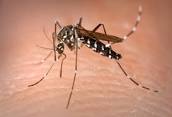Zika Virus
Zika virus is spread to people through bites of Aedes mosquitoes. The symptoms of Zika virus infection are fever, rash, muscle and joint pain and conjunctivitis (red eyes) Symptoms are usually mild and can last from several days to a week. The Aedes mosquito can also spread dengue and Chikungunya viruses.
Outbreaks of the Zika virus infection have occurred in countries in Central and South America, several islands in the Caribbean, southeast Asia and Pacific islands such as American Samoa. Click here to see affected regions and countries. In the United States, Zika cases have been reported in travelers returning from Zika-affected areas.
If you are traveling to a Zika affected area, you could be at risk for infection. You should take steps to avoid mosquito bites when traveling and pregnant women planning to travel to affected areas should consult with their health care provider before traveling.
Take steps to avoid mosquito bites and if you think you may have Zika, contact your health care provider. As mosquito season takes hold in our area, individuals who have been infected from other areas currently experiencing an outbreak may transmit the virus if they are bitten by a mosquito and then local mosquitos have the potential to infect other individuals.
As we enter mosquito season locally, everyone should protect themselves against mosquito bites and work to eliminate mosquito breeding sites in and around homes. See more detailed information below about prevention steps and ways to reduce mosquito breeding sites.
For information on confirmed cases of Zika virus infection in Maryland, visit the Maryland Department of Health and Mental Hygiene website.
Symptoms
The most common symptoms of Zika virus infection are:
- Fever
- Rash
- Joint and muscle pain
- Conjunctivitis (red eyes)
- Headache
- Vomiting
Symptoms may last up to a week. Most people infected with Zika experience no symptoms or only mild symptoms
Transmission
Zika is primarily transmitted through the bite of infected Aedes mosquitoes, the same mosquitoes that spread Chikungunya and dengue. These mosquitoes are aggressive daytime biters and they can also bite at night. Mosquitoes become infected when they bite a person already infected with the virus. Infected mosquitoes can then spread the virus to other people through bites. It can also be transmitted from a pregnant mother to her fetus during pregnancy or around the time of birth. There has been at least one reported case of the virus spread through blood transfusion and possible spread of the virus through sexual contact.
Prevention
The best way to prevent the Zika virus infection is to avoid mosquito bites. Currently, there is no vaccine to prevent Zika virus infection. According to the CDC:
- Use insect repellents containing DEET, picaridin or IR3535 on exposed skin. Apply insect repellents after applying sunscreen.
- Treat clothing with permethrin or purchase permethrin-treated clothing.
- Wear long-sleeved shirts and long pants when possible.
- Use air conditioning or window /door screens to keep mosquitoes outside, or sleep under a mosquito net.
- Empty standing water from containers such as buckets, bowls, flower pots, wheelbarrows and children's outdoor toys.
See the video below for helpful information from the Pan American Health Organization.
Additional prevention information is available on the CDC website at www.cdc.gov/zika.
Treatment
There is no vaccine or medicine to treat Zika virus disease.
- See a health care provider for follow-up
- Get plenty of rest and drink fluids to prevent dehydration
- Take medicines, such as acetaminophen, to relieve fever and pain
Zika Virus and Pregnancy
The Zika virus can be passed from a pregnant mother to her fetus during pregnancy or around the time of birth. It is not known how often Zika perinatal transmission occurs. Sexual transmission is possible. There is no vaccine to prevent Zika virus infection. Pregnant women can and should choose an EPA-registered insect repellent and use it according to the product label. Given the potential risks of maternal Zika virus infection, pregnant women whose male partners have or are at risk for Zika virus infection should consider using condoms or abstaining from sexual intercourse.
While researchers learn more about the risk of Zika virus infection during pregnancy, the CDC advises pregnant women to postpone travel to areas where Zika virus transmission is ongoing. Pregnant women and women who are trying to become pregnant or thinking about becoming pregnant should talk to their health care provider before traveling to Zika-affected areas and follow steps to prevent mosquito bites while traveling.
Pregnant? Click here for important information from the CDC.
Zika virus and pregnancy Q & A:
Controlling Mosquitoes
Summer hasn't arrived yet but it is never too early to start thinking about controlling the mosquito population in the community. Aside from the annoyance of a mosquito bite, an infected female mosquito (Aedes aegypti or Aedes albopictus) can spread Zika, dengue and chikungunya viruses. People become infected with the viruses after being bitten by an infected mosquito.
Protecting yourself, your family and your neighborhood from mosquitoes involves-
- Eliminating sources of standing water in and around your house so that mosquitoes cannot breed
- Keeping mosquitoes out of your house
- Preventing mosquito bites
For detailed information about controlling mosquitoes, click on the Department of Environmental Protection's website.
The Centers for Disease Control and Prevention (CDC) also has helpful information on controlling mosquitoes here.
Additional Information
- CDC Zika Virus Infection Q & A
- CDC Zika Virus Travel Notices
- CDC Zika Virus Infection Information for Pregnant Women
- Information for Health Care Providers
- Maryland Department of Health and Mental Hygiene
- Maryland Department of Health and Mental Hygiene Information for Clinicians
- Pan-American Health Organization/World Health Organization Zika Webpage

